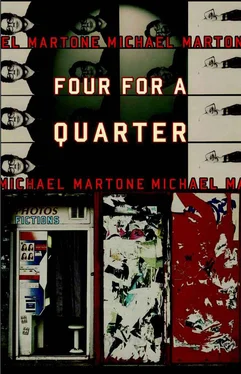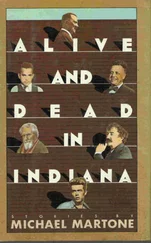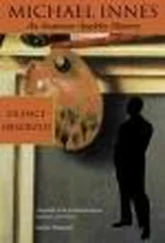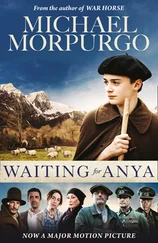I never see. I can't look. I won't watch. I'll turn away when they stop up my arm, bend the elbow to tap this other drink. I am so wan, I wane, not enough of any humor in me to fill a flute let alone a liter. I am empty, empty enough. I am all out of going all out. I will clench the rubber ball and focus on the horizon line out the porthole, and, afterward, peel and eat the proffered orange orange. And if they ask, I already know my type. O, I will say, O. Negative. Donor. Universal.
THUCYDIDES AT SYRACUSE
I carry a shield-shaped ostrakon, a fragment of some vessel, with me wherever I go. On the empty side, my name, Thucydides, is scratched into the blank black back of a wine amphora. On the reverse, a red-figured head — all curly curls, laurel leaf— crowned, glazed and unblinking almond eyes — vomits at someone's feet. A symposium, I suppose. A document — evidence of Socrates himself corrupting the flower of Athens's youth. He's dead now. Pericles too. The plague. I survived it somehow. The dying leaking blood from their eyes. Alcibiades, Nicias, Demosthenes, all, the whole lot of them gone. The Athenians gave me a bag of these ballots when they bagged me, sent me packing after my less than stellar performance at Amphipolis's defense. I also have those other shards, the sack of cracked pottery that made me a general. Democracy, a bunch of speeches, then a vote. It keeps the potters in business. I keep the more interesting scraps on my desk as souvenirs.
Lame soldier, I am a writer now, writing what I call History, my own and this endless war's. More often than not, I draw a blank and must make up some great oration or debate or detail, the Persians always just over the horizon, yet another conspiracy or betrayal, and when I'm blocked, I fidget, try to fit the bits of crockery together, imagine I can make all these cracked pieces whole again or patch them up enough to hold water, or no, a cup of disappointing pinot noir, or, better yet, a bitter dram of bile, pushing the memories around on the empty battlefield of parched parchment.
I was in my cups. I am a writer after all. And — here's a good one — banished from Athens, I fled back to goddamn Amphipolis where I first hit bottom to hit it again. My people had some land hereabouts — a rotting olive grove, a spent vineyard, a played-out silver mine. So I have a front row seat to compose my own narrative of fucking up. I am in recovery. One day at a time. Sure, I work the program here. I go to meetings down at the Dionysion, a Doric ruin on the south side. My name's Thucydides. Hello, Thucydides.
The shield is the not-so-secret weapon of this war, the most important part of the whole panoply. I hang mine on the wall. The little owl's two big owl-eyes look like shields on the shield. You strap the thing to the forearm instead of holding it in your fist. Heavy with all that hammered bronze, its rim has a curved lip to rest on your shoulder. Big enough, it covered the guy to your left, and the guy to your right covered you. All together, rushing at the enemy's phalanx — the ash spears splintering on the shields. The clatter. Sophocles puts that in all his plays, that thrill. The shock, then, of shield on shield, and then the leaning into it, the othismos, the rank behind you pushing forward with their shields, the aspis cold on your ass, and the rank behind the rank behind you, now, smashing into the back, and the whole massed mess slowly beginning that pivot, a drunken herd stumbling over the litter of popped-off greaves and the mud of men who have stumbled under the scrum, stomped upon, finished off by the lizard killers on the reverse end of the pike. The agon. All of that. And then one line or the other breaks, and the first thing you fling is your thirty-pound hoplon, chuck it at the guy behind you who is unsheathing his sword to run you down now that you are running, no armor on your naked back. With the shield or on it.
So much of what has happened hasn't happened yet in my History. I lag. I rehearse each trauma at the meetings as I draft it — this battle, that skirmish, the siege here, the slaughter there. Fall off the wagon. Invoke the muse. Lubricate my tongue. At night, after I have wrestled with a passage, the massacre at Syracuse, say, I retire to Phoebe's on the plateia, overlooking that wine-dark sea, and toast the German tourists, drinking Jagermeister, with burnished retsina in my super-glued ostrakon. I dance, a regular Zorba, smashing plate after plate on the paving stones beneath the plane trees.
I have been stuck at Syracuse for a long time, the nineteenth year of the war. Last spring I made the trip, a scudding trireme under Hermes's protection. The banks of Assinarus, I stood there. The Athenians there pelted, pressed on all sides for days. Missiles, javelins, harassed by cavalry. They made for this river, thinking they would breathe easier once they crossed, driven on by fear, by exhaustion, by thirst. Thirst. They rushed in here, all order gone, each wanting to be the first to cross, the enemy now on each shore making that impossible. Huddling together, they trampled each other, some killed by arrows, bolts, darts, others tangled in the baggage, drowned. Missiles rained down on them (I can see that), most drinking greedily, heaped together in the hollow of the river. The Peloponnesians followed, butchered the Athenians in the water, now instantly fouled, running red, but they went on drinking just the same, mud and all, bloody as it was, most even fighting each other to have it.
How to write that?
Recovery. They tell you, and you are to repeat, that you are powerless — at the mercy of nature, the universe. The disease metaphor allows one to abandon free will, self-control. There are plenty of higher powers — all the goddamn gods and goddesses, the nymphs and spirits. It's a crock. Impossible to give oneself up, to get over anything. I dip my hand into the cloudy Assinarus, drink and drink and drink. Always, there's never enough, too much.
Back in Amphipolis, still ostracized, old Thucydides (that's me), must suffer random drug tests. He pisses history into a cup.
UTAH
So the temple maids had me cornered on that floating platform where you are made to look at the mural of the universe and the white life-sized statue of Christ Almighty at the end of the tour of the temple grounds when I asked them why, in God's name, does everything represented in art here have to be done in this illustrative realistic style when maybe another style a bit more abstract, say, or distorted by emotion, even, could represent the enormity of the things you want to represent, because Christ and all the angels might be real but might not fit best into a realistic frame or might not even be perceived by our puny visual apparatus, you know, might be invisible or perhaps warped in some way, in shadow maybe, and anyway the Impressionists showed us that, hey, yellow haystacks are sometimes purple, like at night or when the sun is behind a cloud, and the temple maids looked at me utterly bewildered, not being able to begin to see what I was driving at and saying to me, again, this is what He looks like, like don't you see, so how, in God's name, can He look any other way than the way he looks.
COLORADO
So we turned a corner in downtown Denver and they all stopped me, grabbing my arm and pointing off into the distance beyond one of those glassed-in skywalks crossing the street up ahead, up in the air, and said, look, there, that's where the mountains are and they are just beautiful, you should see them, and I said, where, I don't see anything and I didn't because, once again, it was all hazy, it's always all hazy anytime I'm in Denver, the sky a kind of white sheet backdropped behind all the buildings of Denver, and they said well you should see them and I said again, yeah, I should, but I don't see any mountains and every time I come to Denver people tell me there are mountains here but I never see them even though they point and say there are mountains there so I am beginning to think there aren't any mountains at all, that there never were any mountains, just this funny primed canvas sky waiting for an artist, any artist, to fill in all the details for a picture you all say you can see.
Читать дальше












